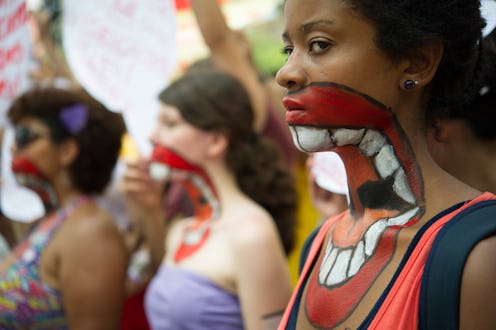
A hashtag campaign under the title of Safety 4 Survivors began on Twitter on Tuesday with prominent women advocacy groups, political figures, and other social media users joining the conversation. The campaign was first created by The National Network to End Domestic Violence, which tweeted, "Welcome to the #Safety4Survivors chat as part of #DVAMWeekOfAction!" As part of the #DVAMWeekofAction, NNEDV holds "Twitter Chat Tuesday" and Tuesday's topic was creating a safe society for domestic abuse survivors.
Executive vice president of NNEDV and founder of The Safety Net technology project, Cindy Southworth, explains what the Safety 4 Survivors hashtag is about and what it aims to achieve. "We know that to truly change culture and end domestic violence," Southworth says. "We must move this terrorizing behavior out of the shadows and into our everyday conversations. Advocates and activists have been recognizing Domestic Violence Awareness in October since 1981. NNEDV’s Twitter chat today was trending in three major cities due to the creativity and dedication of countless partners helping us to raise awareness and end violence."
On the surface, the Safety 4 Survivors hashtag has no direct association with Sunday evening's Me Too hashtag, a campaign that highlighted the pervasiveness of sexual abuse and assault. But both seem connected by the dismal fact that much of the sexual abuse survivors experience takes place in domestic or familiar contexts. According to research compiled by anti-sexual assault organization, RAINN, at least 25 percent of sexual violence is committed by a former partner while 45 percent is committed by an acquaintance.
With the hashtag's reach into multiple cities, Safety 4 Survivors could reinvigorate cultural conversations on the autonomy and rehabilitation of survivors. "In a digital age," she says, "there really isn’t a dividing line between online and offline spaces. Speaking out on social media may indeed reach more of your friends and loved ones than raising the issue of safety and justice over the dinner table."
And one tweet from Southworth brings attention to the lack of financial independence many domestic abuse survivors suffer. "Financial independence is so important to survivors (and everyone!) #Safety4Survivors," Southworth tweeted. Financial dependence is one of the key reasons why many domestic abuse victims remain in toxic and dangerous relationships. Research conducted time and again shows that while domestic abuse is not a class-specific issue — it can happen to any woman of any socioeconomic standing — poor women are still much likelier to remain locked in abusive relationships due to lack of financial freedom.
In addition to complex issues like finances, people also called for intersectionality in the Safety 4 Survivors conversation. Leigh Stein, one of the people tweeting the hashtag, commented on this need. Stein, author of a memoir on love, loss, and abuse titled Land of Enchantment, tells Bustle, as an able-bodied ally, she has noticed that disabled survivors are often left out of the conversation on domestic violence.
Disability and depression are often used against domestic abuse survivors, according to Stein. "I have friends who are survivors of abusive relationships," she tells Bustle, "and their disability was used against them by their abusers. That's not something I see talked about as often."
So, what can allies do to address this lack of intersectionality? "Amplify [disabled survivors'] voices," Stein says. "We should be amplifying other voices in whatever way we can, so that the conversation can continue."
Another group to join the Safety 4 Survivors hashtag was Casa de Esperanza, an organization that tackles domestic violence in Latinx communities. Rebecca De León, communications and marketing head at Casa de Esperanza, tells Bustle that social media users can use their very own digital presence to shed light on domestic abuse.
"Users can leverage social media to raise awareness of some of the systemic barriers that keep victims of domestic and sexual violence silenced and away from safety," De León says. For example, in immigrant communities, fear of deportation keeps many victims from speaking out.
Although the real-time Q&A session on the Safety 4 Survivors hashtag is over, the cultural conversation on domestic violence will carry on. Social media users can go through the tweets in the hashtag and see thoughtful and resourceful answers to a variety of questions. From financial independence, intersectionality, and disarming abusers to social issues like addressing toxic masculinity, encouraging people to speak up, and more, Safety 4 Survivors is doing desperately-needed work to address domestic violence.